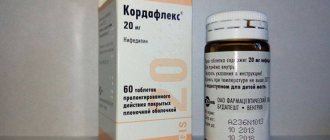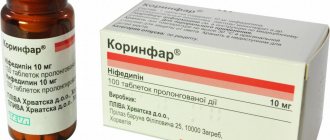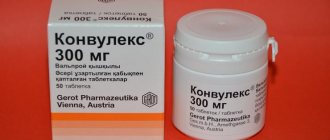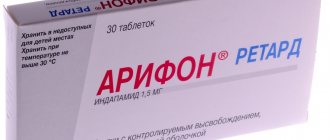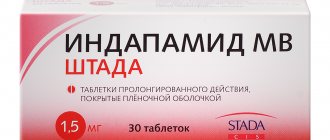The drug Egilok (the active ingredient is metoprolol tartate) is a beta-blocker.
It is used to treat hypertension, heart failure and angina.
The clinical pharmacokinetics of Egilok is described by the fact that metoprolol is largely absorbed by the intestine, and more than 95% of the oral therapeutic dose is usually excreted in the urine in the form of metabolites. The remaining 5% is excreted as unchanged metoprolol.
Since food can increase the bioavailability of metoprolol, it is advisable to take the drug during or after meals.
The drug is distributed very quickly between the blood and various extravascular (extravascular) areas, and only 1 to 2% of the total amount of drug in the body is localized in the blood. Serum protein binding is about 10%.
The drug easily penetrates the placenta and the concentration in the umbilical cord and maternal venous blood is approximately the same. Despite the 3-to-4-fold accumulation of Egilok in breast milk, adverse reactions when breastfeeding a child seem unlikely if the child’s liver function is not highly developed.
Impaired renal function has little effect on the bioavailability of metoprolol, but affects the excretion of metabolites from the body through the kidneys. However, approximately 50% of the metabolites are cleared from the body of patients with a removed or absent kidney during the 5-hour dialysis period. Liver cirrhosis increases the bioavailability and reduces the total clearance of metoprolol.
The β-blocking effect is linearly dependent on the dose and plasma concentration of the drug . The rate of decline in effect can be slowed by administering the drug in the form of controlled-release preparations (for example, Egilok Retard).
The principle of action of Egilok: the active component of the drug reduces the need for oxygen in the myocardium (heart muscle) by reducing intravascular blood pressure, heart rate and myocardial contractility. Due to this, the period of relaxation of the heart muscle during heartbeat when taking Egilok is extended, and this, in turn, improves blood supply and oxygen uptake by the myocardium with impaired blood flow.
Pharmacological properties of the drug Egilok
A selective β-adrenergic receptor blocker, has antianginal, antihypertensive and antiarrhythmic effects, reduces the automaticity of the sinus node, inhibits AV conduction, reduces the inotropic function of the myocardium and heart rate. The antihypertensive effect stabilizes at the end of the 2nd week of drug use. Reduces the number of angina attacks, reduces myocardial oxygen demand, and increases tolerance to physical activity. In case of myocardial infarction, it limits the ischemia zone of the heart muscle and prevents heart rhythm disturbances. The main advantage of Egilok Retard (extended-release tablets) is the prolonged release of metoprolol. The therapeutic effect is observed at a significantly lower concentration of metoprolol in the blood than when taking metoprolol in conventional tablet forms. Therefore, it is enough to prescribe 1 tablet per day of Egilok Retard to achieve a clinical effect. The drug is quickly and completely absorbed into the gastrointestinal tract (95% of the dose). The absorption of metoprolol in retard form is significantly prolonged, which determines a uniform concentration of the drug Egilok Retard in the blood plasma and a relative bioavailability of 80% compared to the schedule of changes in the drug content in the blood after administration of immediate-release metoprolol. The maximum concentration in the blood plasma is achieved 1.5 hours after oral administration and 2–6 hours after the drug in retard form. Plasma protein binding - 12%. The volume of distribution is 5.6 l/kg body weight. Metoprolol is metabolized in the liver; its metabolites do not show activity. About 5% of the dose is excreted unchanged in the urine.
Use during pregnancy and pregnancy
Egilok is prescribed to women during pregnancy only if the degree of expected positive effect far exceeds the likely risk to the unborn child. Studies have not been conducted on the effect of the drug on embryos and infants, so it is not possible to say with certainty about possible threats.
Women who are breastfeeding a baby are not prescribed Egilok for the same reasons. If the drug is necessary for the normal health and functioning of a nursing mother, she should stop breastfeeding.
The dosage of Egilok during pregnancy or lactation is determined by the attending physician on an individual basis. During the course of therapy, the doctor monitors the patient’s condition and monitors the indicators of the child’s intrauterine development.
Indications for use of the drug Egilok
- AH (arterial hypertension);
- IHD: stable or unstable angina (except Prinzmetal's angina);
- heart failure;
- heart rhythm disturbances (sinus, supraventricular tachycardia; ventricular extrasystole);
- arrhythmia due to mitral valve prolapse;
- secondary prevention after myocardial infarction;
- functional disorders of cardiac activity, accompanied by tachycardia;
- hyperthyroidism;
- prevention of migraine attacks.
How much does it cost and what can be replaced?
The blood pressure medicine Egilok can be replaced with drugs with a similar composition and mode of action. Analogues of Egilok:
- Betalok;
- Vasocardin;
- Concor;
- Corvitol;
- Lidalok;
- Metozok;
- Metoprolol;
- Emzok.
Before replacing the drug Egilok with an analogue, you should consult with your doctor. The doctor himself can offer an analogue if he is safer than Egilok. Typically, a replacement drug is sought for patients who are at risk due to contraindications, pregnant and lactating women.
The price of the drug in pharmacies is 215 rubles per package of 30 tablets.
Use of the drug Egilok
For hypertension (arterial hypertension), the initial dose of Egilok Retard is 50 mg/day in 1 dose. The daily dose can be gradually increased to 100–200 mg per dose. Egilok Retard can be used with other antihypertensive drugs to enhance the hypotensive effect. For the treatment of angina pectoris, the dose is 50 mg 1 time per day with further dose titration to the clinically optimal dose. If necessary, the dose can be increased to 100–200 mg per dose. Egilok Retard can be used with other antianginal drugs. For heart failure, the initial dose is 25 mg/day. If necessary, every 2 weeks the dose can be increased to 50 mg, after another 2 weeks - to 100 mg, if necessary, after 2 weeks to 200 mg. For arrhythmia, the initial dose is 50–200 mg/day in 1 dose. After myocardial infarction, for the purpose of secondary prevention, the dose is selected individually under the control of heart rate and blood pressure. For the prevention of migraine attacks, the usual dose is 100–200 mg/day in 1 dose. The tablets are taken once a day (in the morning), without chewing and with a sufficient amount of liquid. The drug can also be taken with food or on an empty stomach.
Contraindications to taking pills
Before using the blood pressure medication, you must carefully read the instructions. Egilok is a serious drug with a large list of contraindications:
- sinus node dysfunction;
- clinically significant sinus bradycardia;
- parallel treatment with monoamine oxidase inhibitors;
- individual intolerance to components;
- disturbance of conduction from the sinoatrial node to the atria;
- hemodiscirculatory processes;
- severe form of bronchial inflammation;
- atrioventricular block 2 or 3 degrees;
- breastfeeding period.
The antihypertensive drug should not be prescribed to children under the age of 18, since no studies have been conducted on the safety of taking the tablets in children.
Taking Egilok for high blood pressure is permitted only as prescribed by a doctor. Before prescribing, the doctor conducts a comprehensive examination of the patient to eliminate the risk of being included in the group due to contraindications.
Side effects of the drug Egilok
Decreased heart rate, blood pressure. AV conduction disturbances, symptoms of heart failure, and depression are also possible. Side effects such as fatigue, headache, dizziness, and sleep disturbance may occur. In many cases, these phenomena are temporary and disappear on their own when the dose of the drug is reduced. Rarely, nonspecific skin reactions and coldness of the extremities, vomiting, diarrhea, constipation, bronchospasm, thrombocytopenia, and impaired liver function occur. If any other side effects occur that are not listed in the instructions, you must inform your doctor.
Side effects
The medicine is well tolerated by patients, but moderate side effects are quite common at the beginning of therapy. Some negative phenomena continue to be observed or increase in severity, which forces Egilok to be replaced with another medicine.
Often the tablets cause dizziness and a feeling of increased fatigue, and less often - headaches.
The drug can reduce concentration, cause drowsiness during the day and insomnia at night. It can provoke seizures, depression, and hyperexcitability. The heart may react with bradycardia and the development of hypotension, fainting, cold hands and feet, worsening heart block, and arrhythmias are possible. Isolated cases of gangrene have been described in patients with impaired peripheral circulation.
From the gastrointestinal tract, constipation, nausea, and dry mouth are often observed. The development of various forms of allergic reactions, hair loss, and exacerbation of psoriasis is possible. Many patients experience coughing, shortness of breath, and dry eyes.
Special instructions for the use of the drug Egilok
The drug should be used with caution in the treatment of patients with diabetes mellitus, with diseases of peripheral arteries, pheochromocytoma (it is possible to use the drug Egilok Retard only in combination with α-adrenergic receptor blockers), impaired renal and liver function. Before starting treatment, it is necessary to determine the function of the liver and kidneys. Treatment with Egilok Retard should be discontinued gradually. Sudden cessation of treatment, especially in the presence of cardiovascular pathology, can lead to a worsening of the condition (withdrawal syndrome). The use of Egilok Retard may cause fatigue or slight dizziness. Therefore, during the treatment period, it is necessary to refrain from driving vehicles and engaging in potentially hazardous activities that require increased concentration and speed of psychomotor reactions. If a patient seeks medical help or needs surgical treatment, be sure to notify the doctor that the patient is taking the drug Egilok Retard. Prescribing Egilok Retard during pregnancy and breastfeeding is possible if the potential benefit to the mother outweighs the risk to the child.
Indications and contraindications
Egilok is widely used for various forms of hypertension. It can serve as the only drug of choice or participate in complex therapy of hypertension. Also, angina pectoris due to coronary artery disease can be considered an indication for the use of Egilok tablets. The medicine reduces the frequency of attacks, reduces their severity, treats asymptomatic forms of pathology, and optimizes performance.
For heart attacks, the drug has also found application - it seriously reduces the mortality rate because it prevents ventricular fibrillation.
Egilok is taken almost immediately after a heart attack in complex treatment; it is also indicated in the late stage of acute coronary circulatory disorders.
The drug shows especially good results in patients with diabetes mellitus (with a heart attack compared to other medications). In addition, early start of taking the pills reduces the risk of another heart attack. Other testimony of Egilok:
- tachycardia due to functional abnormalities in cardiac activity;
- ventricular extrasystole;
- heart failure of a chronic, progressive form;
- obstructive cardiomyopathy (in a set of measures);
- thyrotoxicosis (together with other medications);
- frequent migraine attacks to prevent them.
The medicine has a number of important contraindications. It should not be taken if you have allergies, intolerance to metoprolol or all beta blockers, 2-3 degree AV blockades, decreased rhythm (less than 50 beats), or pacemaker weakness. Medicine is also prohibited in the following cases:
WE RECOMMEND THE ARTICLE!
Bisoprolol tablets help with high blood pressure. Read more >>
- cardiogenic shock;
- serious forms of circulatory disorders of peripheral arteries and veins;
- age under 18;
- severe types of bronchial asthma;
- adrenal tumor;
- breast-feeding.
Therapy is carried out with caution in case of diabetes mellitus and any type of bronchial asthma, COPD, myasthenia gravis, and other types of heart block. Also, strict instructions on how much and how to drink the product, and regular examinations will be necessary for patients with Raynaud's syndrome, renal failure, and psoriasis.
The use of Egilok during pregnancy is possible for health reasons, but, in general, is not recommended. This is associated with the risk of respiratory depression and bradycardia in the newborn. Also, within 2-3 days from the moment of birth, sugar and blood pressure levels are assessed in children whose mothers received treatment with Egilok.
Interactions of the drug Egilok
Caution is necessary when using the drug simultaneously with:
- verapamil and diltiazem - risk of hypotension, bradycardia, atrioventricular block, asystole;
- clonidine - clonidine should be stopped a few days after the end of metoprolol to avoid the development of withdrawal syndrome;
- narcotic drugs - the risk of developing a cardiodepressive effect;
- ergotamine - increases the vasoconstrictor effect);
- some drugs that affect the central nervous system: sleeping pills - bromazepam, lorazepam;
- tranquilizers - chlordiazepoxide, trimethacin, tofisopam;
- tri- and tetracyclic antidepressants - citalopram, moclobemide;
- neuroleptics - chlorpromazine, triflupromazine - and alcohol - risk of arterial hypotension, effect on the central nervous system;
- NSAIDs, such as indomethacin, may reduce the antihypertensive effect of metoprolol;
- estrogens, for example norethindrone, norgestrel - the antihypertensive effect of metoprolol is reduced;
- hypoglycemic oral agents, for example chlorpropamide, glibenclamide, tolbutamide and insulin - enhancing their hypoglycemic effect, masking the symptoms of hypoglycemia;
- curare-like muscle relaxants - increased neuromuscular blockade;
- H2 receptor antagonists, for example cimetidine - may increase the bioavailability of the drug);
- rifampicin, barbiturates, such as phenobarbital, secobarbital, pentobarbital - the antihypertensive effect of metoprolol may be reduced.
Particular caution is required when used with ganglion-blocking drugs and other β-adrenergic receptor blockers, sympathomimetics, and class I antiarrhythmic drugs.
Alcohol compatibility
The drug Egilok for blood pressure is not prescribed simultaneously with alcohol-containing drugs and substances. When taken simultaneously with ethanol, the likelihood of developing adverse reactions from the nervous system increases. Alcohol can provoke a sharp drop in blood pressure to critical levels, which will lead to brain hypoxia.
In the absence of timely assistance to a patient who has taken pills simultaneously with alcohol-containing drugs or drinks, irreversible processes can be launched in the body that will lead to brain death and death.
Overdose of the drug Egilok, symptoms and treatment
Symptoms: arterial hypotension, sinus bradycardia, AV block, heart failure, cardiogenic shock, asystole, nausea, vomiting, cyanosis, bronchospasm, loss of consciousness, coma. Treatment: gastric lavage, activated charcoal, for severe hypotension - β-adrenergic receptor agonists (norepinephrine) or intravenous atropine (for bradycardia). If there is no effect, dopamine or dobutamine should be prescribed. Glucagon (1–10 mg) may be effective. In severe cases, implantation of an artificial pacemaker may be necessary. Bronchospasm is eliminated by intravenous administration of β2-adrenergic agonists. Metoprolol is practically not excreted from the body by hemodialysis.
Possible negative reactions
Taking Egilok can lead to negative reactions from the functioning of organs and vital systems:
- organs of perception: temporary blurred vision, shortness of breath, runny nose;
- central nervous system: rapid fatigue, headaches of unknown origin, dizziness, seizures, loss of concentration, depression, nightmares, feelings of unreasonable anxiety and fear, panic attacks, imaginary visions, memory impairment;
- gastrointestinal tract: pain in the epigastric cavity, difficulty defecating, diarrhea, dry mouth;
- other body reactions: sexual impotence, decreased libido, skin rashes, increased sweating.
If adverse reactions occur in the body, you must contact your doctor, who will prescribe appropriate symptomatic treatment and decide whether to continue therapy or discontinue treatment with Egilok.
Egilok price
The cost of the drug on the Internet and in pharmacies differs and depends on the number of tablets in the package and the concentration of the active substance. Approximate prices of Egilok produced in Hungary in Moscow are listed below:
| Concentration, mg | Number of tablets per package, pcs. | Internet price, rubles | Pharmacy price, rubles |
| 25 | 60 | 133 | 150 |
| 50 | 60 | 142 | 167 |
| 100 | 60 | 194 | 210 |
| 100 | 30 | 129 | 150 |
